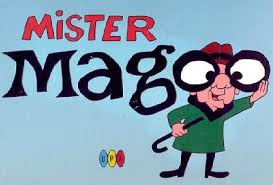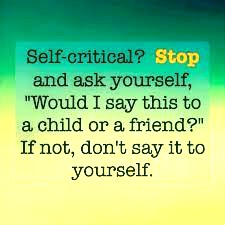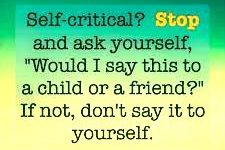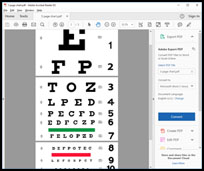Many of us have the mistaken idea that pointing out our faults to ourselves will motivate us to do better. “Get that lazy fat body to the gym!” we’ll tell the image in the mirror. Then the part of us who really is doing our best already, and needs encouragement, not blame, just wants to rebel and have a cookie for comfort!
This self-accusing pattern can show up in a big way if we have limitations in our eyesight. “What’s wrong with me?”, we think, when others seem to have no problem seeing something which is difficult for us. And this self-blame can even get worse at first when we begin a vision improvement program. We used to think we were fine — now we find that in addition to our vision challenges, we have a lot of terrible unconscious straining habits!

When I started learning about vision improvement, first I had to fully admit how strained my vision was with that -10 prescription. I was extremely tense, a “bundle of nerves”. Then when I learned relaxing my mind and visual system would help my eyesight, and relaxation seemed so difficult for me, I really felt defective. Little kids could do this — what was my problem? People would say “Nancy, just relax!” and I’d have no idea how to do that.
Reading all the vision improvement classics helped somewhat. I was obsessive about this, true to my over-trying form — I think I read Jacob Liberman’s “Take Off Your Glasses And See” 4 times. I was desperately looking for the hidden secret (hidden to me, at least) to improving my strong nearsightedness. In Aldous Huxley’s “Art Of Seeing”, when he discussed the straining-to-see mindset of what he called the “greedy end-gainer”, it jolted me: I recognized myself. I started to really get it that I was trying too hard to see, and that pattern, paradoxically, was keeping my vision from improving.
Now I not only blamed myself for having such poor eyesight and being unable to fix it, I blamed myself for being a greedy end-gainer! I wanted to see clearly so much, and to rid myself of the burden of eyeglasses and contacts. Fortunately, I soon realized this self-blame was doing no good, and it felt awful. I started to praise myself for minor visual progress, seeing something I hadn’t noticed before (often because I wasn’t even looking). I was thrilled when I was able to tackle visual tasks which had previously been difficult, like driving in the rain, and they seemed to be no big deal.

It has taken me close to 20 cross-country trips with multiple airport connections, without any glasses, to let me come down from High Alert about doing this the next time. I know I’ll find my gate, even if it changes, and changes again, which has happened. I think I convinced myself early and completely that seeing well was a problem for me, and I was doing it wrong. So that belief is pretty firmly embedded and is moving out slowly.
When I was a child, my mother constantly worried about “Nancy’s bad eyes”, and I mistakenly took this concern as criticism. I was at fault every time I looked at something! Then I took on the blame and started to criticize myself. I’m rewriting this story now. I know how to keep my eyes relaxed, and most of the time I’m giving them a break from focusing intently whenever they need it. I love looking at the summer scenery in a soft way, appreciating the colors, texture, and movement. My vision may not be perfect yet, but it delights me every day, and I appreciate it (and myself!) enormously.
I wore strong glasses, then contact lenses, from age 5 into my 40s. While making many mistakes, eventually l learned how to improve the way I use my eyes and to see in a more relaxed, healthy manner. It is my pleasure to coach others to do the same. Visit me at https://NancyLNeff.com.


I agree that it is bad to self-criticize. I believe that mind and body pull towards each other as if they are bound by bands. If one focuses on something a lot when evaluating himself then he will see himself as that which he focuses on and because of that he will tend to become or stay that which he focuses on.
E.g. people who focus on how fat they are will see themselves as fat and have a very hard time losing enough weight.
But people who focus on how thin they will be when they have lost enough weight will see themselves as thin people in a fat body which will make it easier to eat healthy like thin people do.
This advice does not just go for vision or losing weight, it is useful for many endeavors in life.
Cyber, thanks for your comment. Yes, pointing out faults, in yourself or in others, just leads you to seeing more faults! That’s not much fun. I’d rather focus on the good stuff. 🙂
Thank YOU, Daniela. You gave me a gift with your words. 🙂
Thank you Nancy for all the great insight. You are a true inspiration.